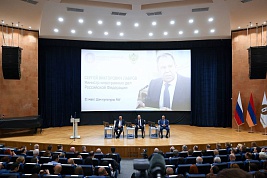Commentary of the Ministry of Foreign Affairs of the Russian Federation Regarding Incident in the Zone of the Georgian-Ossetian Conflict
As is known, the Russian side is making vigorous efforts to resume the work of the Mixed Control Commission (MCC) on the settlement of the Georgian-Ossetian conflict. A few days ago Yuri Popov, the Russian Foreign Ministry's Ambassador at Large and the Russian MCC cochairman, flew out to Georgia. But opponents of normalization have carried out a new provocation.
According to David Bakradze, Georgia's Minister for Conflict Resolution and the Georgian cochairman of the MCC, two SU-25 jets "with Russian identification signs" on the evening of August 6 intruded into Georgia's airspace and fired a missile at a Georgian radar station in the area of the town of Gori, which, by the way, did not suffer. The Georgian representative said further that, after "yesterday's incident," holding a MCC meeting was becoming impossible.
Meanwhile, South Ossetian observation posts reported that an unknown plane had indeed intruded at this time into the conflict zone in the mountainous part of South Ossetia from the eastern direction, that is from the Georgian side and made an unaimed missile launch. The missile fell about 5 kilometers from the radar station in the village of Shavshebi. After a maneuver the plane turned around and flew away in the opposite direction. Soon, about 30 minutes later a Georgian helicopter was noticed in the area, which made several circles over the scene.
The leadership of the Russian General Staff categorically denies the fact of any flights of Russian aircraft at that time in the airspace adjacent to the territory of Georgia.
The fact that the Georgian army has SU-25 planes in service (the South Ossetian side has no aircraft at all) allows supposition that certain forces, acting along familiar lines (enough to recall the incident with the March firing in the Kodori valley in Abkhazia), continue to whip up tension around the conflicts in Georgia. As applied to South Ossetia these habits of the opponents of normalization are no surprise: each time when the signs appear of arrival at an agreement under MCC auspices, provocations are organized to prove the ineffectiveness of the previously established negotiation and peacekeeping mechanisms with Russian participation.
We are convinced that the results of an investigation, which we insist must start at once, will reveal the real organizers and participants of these very dangerous games. Ambassador at Large Popov has urgently left Tbilisi for Tskhinvali to familiarize himself with the situation on the ground.
August 7, 2007
